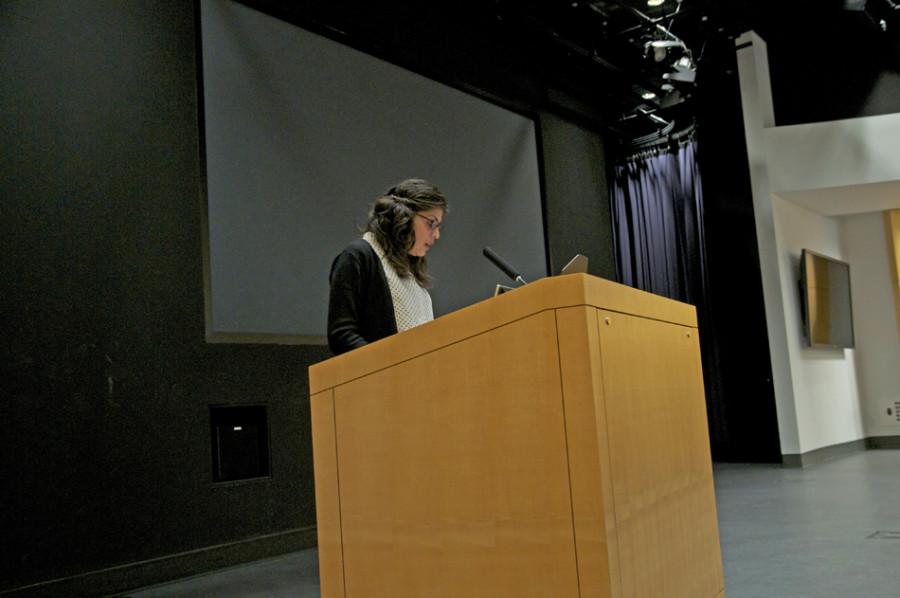Lawyer discusses human rights violations in Mexico
Sophie Mann/The Daily Northwestern
Mexican lawyer Alejandra Ancheita speaks about the state of human rights in Mexico. Ancheita spoke during an event hosted by the Buffett Institute at the McCormick Foundation Center Forum on Thursday.
February 27, 2015
More than 26,000 people have been forcibly disappeared in Mexico since 2005, said Alejandra Ancheita, a Mexican lawyer and human rights defender, Thursday night at the McCormick Foundation Center Forum.
Ancheita, founder and executive director of ProDESC, a non-governmental group that aims to defend and promote human rights, visited Northwestern to speak about human rights violations in Mexico following the disappearance of 43 students from a teachers college in Ayotzinapa.
The night of Sept. 26, 2014, 43 students went missing in the town of Iguala, Guerrero, Mexico. After a series of investigations, protests and arrests, authorities believe the students were killed and their bodies were burned by members of the local crime syndicate Guerreros Unidos under apparent orders of then-Iguala Mayor Jose Luis Abarca.
The alleged kidnapping shook international media and has become the biggest political and public security scandal that Mexican President Enrique Pena Nieto has faced in his term because at least 22 suspects arrested were police officers. Many, including Ancheita, have called on the government to demand justice and respect for human rights.
“One cannot speak about the general state of human rights in Mexico today without mentioning emblematic cases like Tlatlaya and Ayotzinapa,” Ancheita said at the event, which was hosted by the Buffett Institute.
Tlatlaya, a 2014 incident in which Mexican soldiers killed 22 alleged members of a criminal group, was the bloodiest massacre in Pena Nieto’s presidential tenure before Ayotzinapa happened later that year.
“The involvement of law enforcement agents in the forced disappearance of 43 students from Ayotzinapa last September is further evidence of the institutionalized use of violence,” Ancheita said.
Ancheita also said the crime is further proof of the many faults the Mexican government has and refuses to address.
“The failure to discover the whereabouts of all but one of the students has (raised) serious doubts over the investigatory capacity of the state as well as the incapacity to identify and bring those responsible to justice,” she said.
She also spoke about the dangers and attacks many human rights defenders face in Mexico.
“The increasing number of attacks against human rights defenders and the failure to hold those responsible accountable is further evidence of the climate of corruption and impunity in which law enforcement institutions in Mexico operate,” Ancheita said.
Ancheita, who has faced threats and dangers because of her job, said her office supports victims of human rights violations, litigates in national and international cases, cooperates with international committees like the United Nations and advises other local human rights associations.
Ancheita also spoke about the importance of Mexican students who have gone out to the streets, spoken against these injustices and protested against the government, and she encouraged NU students to support the fight against the violations, even from afar.
“Being in communication with the organizations that are supporting these families and sending letters and videos directly to their families is important to them and I think that is a good way to support them,” she told The Daily. “Asking the U.S. government about the support that is given to the Mexican government to address these issues is also an important thing.”
Sofia Rada, event organizer and Buffett Institute student fellow, said the crime proved how badly the Mexican government is doing.
“Finally, here is the proof that the (Mexican) government is not doing things right and that it’s not just the drug cartels,” the Medill sophomore told The Daily. “Maybe now people will pay attention to what’s going on.”
Gwen Stern (Weinberg ’70,’76), who helps raise funds for Semillas, a women’s group in Mexico, said she attended the event because one of the groups Semillas gives grants to is ProDESC. Stern said she was glad she finally got to meet someone who works in the organization.
“(Ancheita) was very effective, especially making the point that this is not an isolated incident in Mexico, this has happened all over,” she said. “What I would’ve liked to hear more about is the impunity of the judicial system there that no one ever gets prosecuted for anything. If they prosecute anybody for this, that will be a step forward.”
Email: [email protected]
Twitter: @marianaa_alfaro


